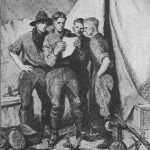There was a comment posted here recently that may or may not have been spam. Because I love comments so much, and because it was an interesting question, I want to reply to it, but it was also off-topic to the post where it appeared, so I’m replying here. If this was your question and was submitted seriously then I apologize for thinking it might be spam. And also thank you for commenting and giving me a chance to respond.
Here’s the comment:
I was interested to know how you center yourself and clear your mind before writing. I’ve had a difficult time clearing my thoughts in getting my thoughts out there. I truly do enjoy writing but it just seems like the first 10 to 15 minutes are usually wasted simply just trying to figure out how to begin. Any suggestions or tips?
 And here’s my suggestion: embrace those ten to fifteen minutes. Think of them as a warm-up. That’s not time wasted. That’s time getting started. If you’re sitting down to write on a specific schedule you’re training your brain to recognize that as writing time, and the time you spend thinking will probably diminish. Even if it doesn’t that’s okay.
And here’s my suggestion: embrace those ten to fifteen minutes. Think of them as a warm-up. That’s not time wasted. That’s time getting started. If you’re sitting down to write on a specific schedule you’re training your brain to recognize that as writing time, and the time you spend thinking will probably diminish. Even if it doesn’t that’s okay.
Here are a couple of anecdotes that might help put this in perspective:
Eudora Welty, if I remember correctly, would sit at her desk for three hours without writing anything. Then she’d write like crazy. She’d also write long, meandering descriptions of the scenery which she’d throw away. This seems to have worked for her.
Gene Wilder described the writing sessions he had with Mel Brooks while working on Young Frankenstein. Brooks would show up with a snack and would fiddle around for half an hour or more discussing how to prepare the snack and what they should have with it. Wilder soon realized that this was the way Mel Brooks worked. He’d focus on something irrelevant before settling down.
And then there’s what Roald Dahl said in his story Lucky Break: How I Became A Writer: “But however much you may want to take up fiction writing as a career, it would be pointless to go along to a publisher and say ‘I want a job as a fiction writer.’ If you did that, he would tell you to buzz off and write the book first.”
In spite of half a dozen creative writing classes and some writing groups I  can’t claim to be an expert on writing. Then again I’m not sure anyone can. You can ask for, and receive, a lot of advice. You can study grammar and read books like Anne Lamott’s Bird By Bird. These things may help, but as with anything else study is no substitute for experience. If you want to do it do it.
can’t claim to be an expert on writing. Then again I’m not sure anyone can. You can ask for, and receive, a lot of advice. You can study grammar and read books like Anne Lamott’s Bird By Bird. These things may help, but as with anything else study is no substitute for experience. If you want to do it do it.
And save the tips for your waiter.







Facebook Comments